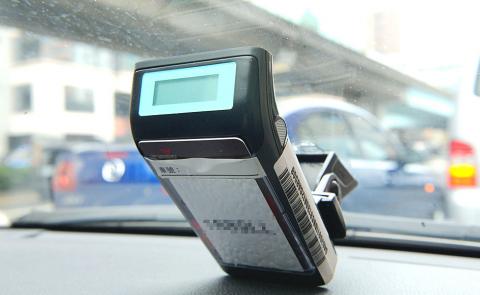Lawmakers from the legislature’s Transportation Committee yesterday questioned plans by the Ministry of Transportation and Communications to force motorists to install expensive on-board units (OBU) in preparation for freeway toll stations charging drivers by the number of kilometers they travel in 2012.
National Freeway Bureau -director-general Tseng Dar-jen (曾大仁) said the bureau recently coducted research on the policy change, during which experts simulated different toll-collecting methods and rates, in an effort to determine how the two factors affected traffic volume.
The bureau would have to analyze the results and then engage the public in dialogue on the different rate plans, adding that it had yet to finalize any plan, he said.

PHOTO: CNA
Although lawmakers were scheduled to review the budget for the National Freeway Construction and Management Fund for the next fiscal year, issues surrounding the freeway electronic toll--collecting (ETC) system quickly became the focus of a question-and-answer session at the committee.
At present, national freeway users have to pay toll fees whenever they drive through tollgates. Other than the ETC system, which requires motorists to install OBUs, motorists can pay toll fees by buying prepaid tickets.
However, the bureau is planning to change the toll-collecting method by charging users according to the distance they travel on freeways to ensure the fair use of the roads by all motorists.
The new policy would require that the great majority of users install OBUs in their vehicles.
As part of an attempt to increase installation and usage rates, Far Eastern Electronic Toll Collection Co (FETC), the contractor entrusted with the task of managing the ETC system, launched a one-year plan this month allowing motorists who have yet to install OBUs to try out the ETC system on a trial basis.
To participate in the trial, motorists must first open an account with FETC and deposit between NT$300 and NT$500. Through an image-recognition system that reads a vehicle’s license plate number, the FETC can deduct the money in the account whenever a vehicle drives through an ETC-only tollgate.
Lawmakers, however, questioned the viability of the bureau’s proposed change in the toll--collecting policy. They were also unhappy with the FETC’s plan to raise usage rates.
“If the FETC can collect toll fees through the image-recognition system, then that means you do not need an OBU to go on the freeways,” Democratic Progressive Party (DPP) Legislator Wang Sing-nan (王幸男) said, adding that the ministry should not be allowed to force motorists to install OBUs when the new toll-collecting policy takes effect.
One of the reasons why people don’t buy the OBU system is that it is considered expensive and individuals have to cover the cost of installation themselves.
DPP Legislator Yeh Yi-jin (葉宜津) and Chinese Nationalist Party (KMT) Legislator Yang Jen-fu (楊仁福) said those buying OBUs before the FETC announced its new plan were buying “a pig in a poke” because for the moment motorists did not need an OBU to drive through ETU-only toll gates.
Tseng, said the FETC’s plan was a short-term experiment not a long-term undertaking. The results of the trial period would be factored into the calculation of monthly OBU usage rate, which will be raised 42 percent by next month, he said.

The Ministry of Economic Affairs has fined Taobao NT$1.2 million (US$36,912) for advertisements that exceed its approved business scope, requiring the Chinese e-commerce platform to make corrections in the first half of this year or its license may be revoked. Lawmakers have called for stricter enforcement of Chinese e-commerce platforms and measures to prevent China from laundering its goods through Taiwan in response to US President Donald Trump’s heavy tariffs on China. The Legislative Yuan’s Finance Committee met today to discuss policies to prevent China from dumping goods in Taiwan, inviting government agencies to report. Democratic Progressive Party Legislator Kuo Kuo-wen (郭國文) said

The Ministry of Economic Affairs has fined Taobao NT$1.2 million (US$36,900) for advertisements that exceeded its approved business scope and ordered the Chinese e-commerce platform to make corrections in the first half of this year or its license would be revoked. Lawmakers have called for stricter supervision of Chinese e-commerce platforms and more stringent measures to prevent China from laundering its goods through Taiwan as US President Donald Trump’s administration cracks down on origin laundering. The legislature’s Finance Committee yesterday met to discuss policies to prevent China from dumping goods in Taiwan, inviting government agencies to report on the matter. Democratic Progressive Party

Taiwan and its Pacific ally Tuvalu on Tuesday signed two accords aimed at facilitating bilateral cooperation on labor affairs, according to Taiwan’s Ministry of Foreign Affairs (MOFA). The governments inked two agreements in Taipei, witnessed by Foreign Minister Lin Chia-lung (林佳龍) and visiting Deputy Tuvaluan Prime Minister Panapasi Nelesone, MOFA said in a news release. According to MOFA, the agreements will facilitate cooperation on labor issues and allow the two sides to mutually recognize seafarers’ certificates and related training. Taiwan would also continue to collaborate with Tuvalu across various fields to promote economic prosperity as well as the well-being of their

Sung Chien-liang (宋建樑), who led efforts to recall Democratic Progressive Party (DPP) Legislator Lee Kun-cheng (李坤城), was released on bail of NT$80,000 today amid outcry over his decision to wear a Nazi armband to questioning the night before. Sung arrived at the New Taipei District Prosecutors’ Office for questioning in a recall petition forgery case last night wearing a red armband bearing a swastika, carrying a copy of Adolf Hitler’s Mein Kampf and giving a Nazi salute. Sung left the building at 1:15am without the armband and covering the book with his coat. Lee said today that this is a serious